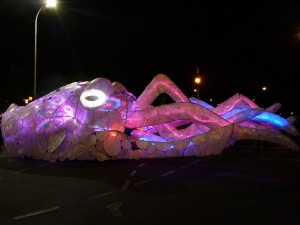adelaide writers week: a review
On the opening weekend of Adelaide Writers Week, Radelaide is a city of convergence. As well as the Adelaide and Fringe Festivals going live the week before, the Clipsal 500 began two days prior to the first novelist opening her mouth in front of a microphone.
It is as if North Terrace is a dividing class line. Over at Clipsal just several blocks away, there are grid girls and Holden vs Ford arguments. Crowds gather to witness endless repetitions of roaring motor cars, complemented by endless options of fried food. There’s tractor pulling. Corporate boxes. And a whole lot of beer.
Replace the beer with a glass of elegant dry white wine, and switch from dusty track side to the lush grass of the Pioneer Women’s Garden, across the road from Elder Park. Beneath blue shade cloth and swishing trees, the (mostly grey-haired) audience can listen to seasoned novelists talk about their craft and buy $16 salads with minted yoghurt and quinoa. Every time I turn around, someone in their fifties looks like a high school art teacher; when I buy a book the man behind the counter hands me my paper bag and says, ‘Marvelous.’
Despite catering primarily to ‘high culture’, Adelaide Writers Week has a relaxed aura of shared discovery. Sunday is children’s day, complete with art projects, storytelling, and painted faces of performers loudly smiling. I tell myself that if I have kids I will bring them here.
I catch Rabih Alameddine in conversation about his most recent novel An Unnecessary Woman, about a septuagenarian in her Beirut apartment. The ex-engineer/ex-painter’s cheeky alacrity and refusal to take himself too seriously makes him a pleasure to watch.
In talking about his novel’s protagonist (who doesn’t seem to fit into Lebanese patriarchal society), Rabih reveals that he desires literature to be dangerous. Because ‘danger removes boundaries between what someone is supposed to be or not.’ At a later session, he says, ‘Gender roles are overrated.’
Sweeping thunder interrupts the discussion as F/A-18 Jets colonise the sky in their low-flying feats for the Clipsal audience, and Rabih compares it to the Israeli jets that fly over Beirut almost daily.
On Monday afternoon, Chris Womersleyis talking about Cairo, a coming of age story in 1980s Fitzroy with Jeff Sparrow. Jeff notes that Cairo is framed through the narrator’s reminiscence. ‘Well,’ smiles Chris Womersley (who, in all aspects, is a fascinating figure), ‘We all tell ourselves stories about what makes us who we are—and they may not necessarily be true. Those memories can be concretised via repetition.’
Next up is a panel on identity with Rabih Alameddine (again!) and Alison Bechdel. Recognise the name? Yes, the Bechdel test is named after her.
The comic artist, best known for Dykes to Watch Out For shrugs off her fame. Instead she says: ‘What my work has been about is creating three-dimensional women that are often forgotten in these films.’
Later in the week, I happen to catch exiled Chinese poet Yang Lian, who has a long history of writing against the Cultural Revolution and a connection to Classic Chinese poetry. Following a halting conversation about his work, a translation of his poem is read before he steps up to the podium and sings out the wavering lilt of Mandarin. He is rhythmic, tonal, and astonishing to listen to; I close my eyes and feel swept along a tunnel of twists and turns.
One of the star authors of the week (counted amongst Elizabeth Gilbert, Eleanor Catton, Alexander McCall Smith, and Adelaide’s own Hannah Kent) was Christos Tsiolkas, an incredibly humble man who seems uncomfortable in front of the audience.
Following the huge success of his book, and subsequent television series, The Slap, Tsiolkas released Barracuda last year to critical acclaim. The novel follows champion swimmer Danny through highschool, intense training, and an ideology of winning. In his hesitant fumble to answer questions, Christos talks about major themes (class, belonging, failure), inspiration (Tracy Moffat’s photos of competitors who came fourth in the 2000 Sydney Olympics), and the nonlinear structure of his novel (‘It’s not about whether this man wins or fails, it’s about whether he becomes a good man.’)
This year Writers Week saw a whole day dedicated to comic artists. They were, however, in a separate, off-site ticketed event; to be honest it felt like segregation. I would love the yearly event to welcome more graphic artists, but also webisode creators, magazine editors, narrative journalists. I’m frustrated with the organisers’ obsession with designing a program only of writers who are notoriously ‘literary’.
Writers Week is an excellent chance to collect and gather the wisdom of authors under whispering branches, at a time when Adelaide is alive with art and people and promise. But the world is changing, and literary fiction and non-fiction are not the only genres of excellent writing. Thank you Adelaide Writers Week, for being wonderful, but please, cut down the class divide.


